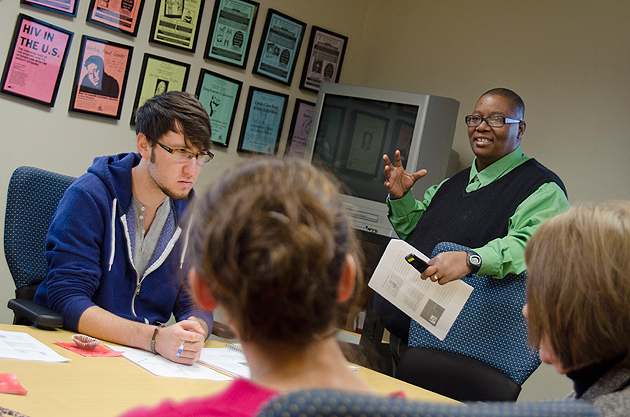
UConn sophomore Mariah Harrington was intrigued when she first noticed the colorful circular UConn “Safe Zone” stickers displayed on windows around campus.
So when the opportunity arose for her to learn more, Harrington jumped at the chance.
Harrington took part in UConn’s Safe Zone Husky Ally training offered by the Rainbow Center. She is one of about 90 individuals who have participated in the workshop this year.
The interactive workshop teaches participants how to be an effective ally for individuals who identify themselves as lesbian, bisexual, gay, transgender, genderqueer, pansexual, two-spirited, or another sexual orientation or gender identity/expression within the campus community.
The Safe Zone sticker – a decal featuring the colors of the rainbow – is presented to participants at the end of each training session. The sticker signifies a person’s lifelong journey to be educated about sexual orientation and gender identity.
“Safe zones are ultimately designed to create visibility,” says Fleurette King, the Rainbow Center’s director. “The people who display decals show there are people who care.”
According to King, Safe Zones were first developed in the 1990’s in response to hate crimes. Because tolerance has increased, Safe Zones now focus on educating people about the growing diversity on campus.
“We create awareness,” King explains. “We prompt people to think about their own reflection on these issues while trying to overcome homophobia and genderphobia. Today, we focus a lot on gender identity and gender expression, which are not the same as sexual orientation.”

Harrington, a Boston native who works at UConn’s Women’s Center, said she wanted to get involved in ally training because she wants to be a part of the support system for people grappling with these types of issues.
She attended the first session this semester, held on Jan. 30, and discovered there was a parallel between the workshop’s mission and that of the Women’s Center, “which deals with gender equality and sexism.”
Harrington feels any stigma surrounding diversity issues is due to a lack of understanding. “The subject is not simple or concrete and is often difficult to navigate,” Harrington says. “It is complex and important.”
Alicia Hartley, of Spring, Texas, was directed to the Rainbow Center, located in the Student Union, by personal goals rather than the popular Safe Zone decal.
“As a member of the LGBTQ community and a person interested in running a cultural center in the future, I wanted to learn how a cultural center operates, its relationship to the rest of the University community, and how cultural centers support students,” says Hartley.
Hartley, who is in her second year of the Higher Education and Student Affairs master’s program, originally got involved when she did a practicum at the Rainbow Center last spring. During this time, she served as a Rainbow Center staff member and facilitator.
“You do not learn anything by skimming over an issue,” Hartley says. “You need to analyze it, discuss it, get diverse viewpoints, and then come to a conclusion on your own.”

Hartley found her practicum at the Center rewarding. Today she still serves as a facilitator of the Safe Zone workshops.
“Every time I do a workshop, I learn so much about group dynamics, the UConn community, different personal experiences, and myself,” Hartley says. “I encourage the participants to challenge me, because I will challenge them. This allows for great discussion where people hopefully feel comfortable enough to speak their minds and ask hard questions.”
Her goal as facilitator is to make sure participants “have a desire to continue these conversations and discussions with people in their lives.”
UConn is currently listed in The Advocate College Guide for LGBT Students; and the LGBT-Friendly Campus Climate Index, an online resource, gives the University a 4.5 out of 5 rating.
Still, King hopes the effects of the Husky Ally Safe Zone workshops continue to spread. Ideally, individuals who participate in the workshops will continue to make positive changes in groups they affiliate with such as their athletic team, sorority, or fraternity.
“We are always looking for where we can squeeze the rainbow,” says King. “Every moment is an educational moment.”
The 2012 spring semester Husky Ally Safe Zone workshops run about three hours and take place in Student Union Room 403. All members of the UConn community are encouraged to attend: faculty, staff, and students. The workshops are free.
Upcoming workshops will take place on: Thursday, March 29 from 1 to 4 p.m.; Tuesday, April 17 from 1 to 4 p.m.; and Wednesday, May 16 from 9 a.m. to noon.
Please send an email to huskyally@uconn.edu for further information on the Husky Ally Training Program and/or to register for a particular date.


